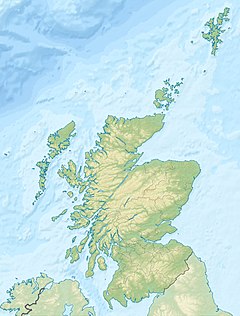Bell Rock Lighthouse

Bell Rock Lighthouse with reef just visible
|
|
|
Scotland
|
|
| Location |
Inchcape Arbroath Scotland |
|---|---|
| Coordinates | 56°26′03″N 2°23′14″W / 56.4342°N 2.3873°WCoordinates: 56°26′03″N 2°23′14″W / 56.4342°N 2.3873°W |
| Year first constructed | 1810 |
| Year first lit | 1 February 1811 |
| Automated | 1988 |
| Foundation | Aberdeen granite |
| Construction | Aberdeen granite tower |
| Tower shape | tapered cylindrical tower with balcony and lantern including keeper's quarter |
| Markings / pattern | white tower with brown band at the base, black lantern |
| Height | 35.3 metres (116 ft) |
| Focal height | 28 m (92 ft) |
| Intensity | 1,900,000 candela |
| Range | 18 nautical miles (33 km; 21 mi) |
| Characteristic | Fl W 5s. |
| Admiralty number | A3108 |
| NGA number | 2616 |
| ARLHS number | SCO-020 |
| Managing agent |
Northern Lighthouse Board |
Northern Lighthouse Board
The Bell Rock Lighthouse, off the coast of Angus, Scotland, is the world's oldest surviving sea-washed lighthouse. It was built between 1807 and 1810 by Robert Stevenson on the Bell Rock (also known as Inchcape) in the North Sea, 11 miles (18 km) east of the Firth of Tay. Standing 35 metres (115 ft) tall, its light is visible from 35 statute miles (56 km) inland.
The masonry work on which the lighthouse rests was constructed to such a high standard that it has not been replaced or adapted in 200 years. The lamps and reflectors were replaced in 1843 and used in the lighthouse at Cape Bonavista, Newfoundland, where they are currently on display. The working of the lighthouse has been automated since 1988.
The lighthouse operated in tandem with a shore station, the Bell Rock Signal Tower, built in 1813 at the mouth of Arbroath harbour. Today this building houses the Signal Tower Museum, a visitor centre detailing the history of the lighthouse.
The challenges faced in the building of the lighthouse have led to it being described as one of the Seven Wonders of the Industrial World.
According to legend, the rock is called Bell Rock because of a 14th-century attempt by the Abbot of Arbroath to install a warning bell on it. The bell lasted only one year before it was stolen by a Dutch pirate. This story is immortalised in "The Inchcape Rock", a poem by 19th-century poet Robert Southey. The rock was the scene of many shipwrecks as it lies just below the surface of the sea for all but a few hours at low tide.
By the turn of the 18th century, it was estimated that the rocks were responsible for the wrecking of up to six ships every winter. In one storm alone, seventy ships were lost off the east coast of Scotland. The Scottish engineer Robert Stevenson had proposed the construction of a lighthouse on Bell Rock in 1799, but cost concerns and the relatively radical nature of the proposal by a young engineer caused it to be shelved. The loss of the warship HMS York and all on board in 1804 resulted in a furore in Parliament. Stevenson sent his design to John Rennie who approved the design and costing. Rennie's reputation led to legislation being passed in 1806 enabling construction to begin.
...
Wikipedia

